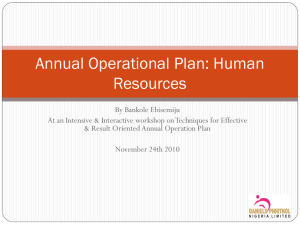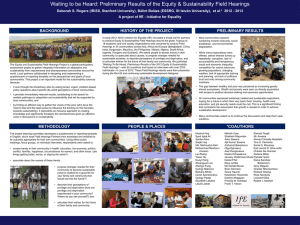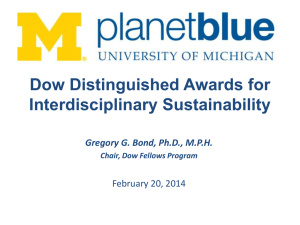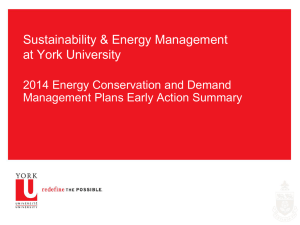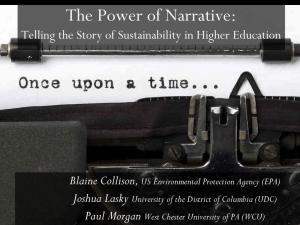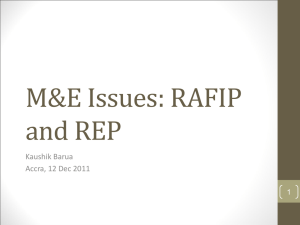IE & Sustainability Program Study
advertisement
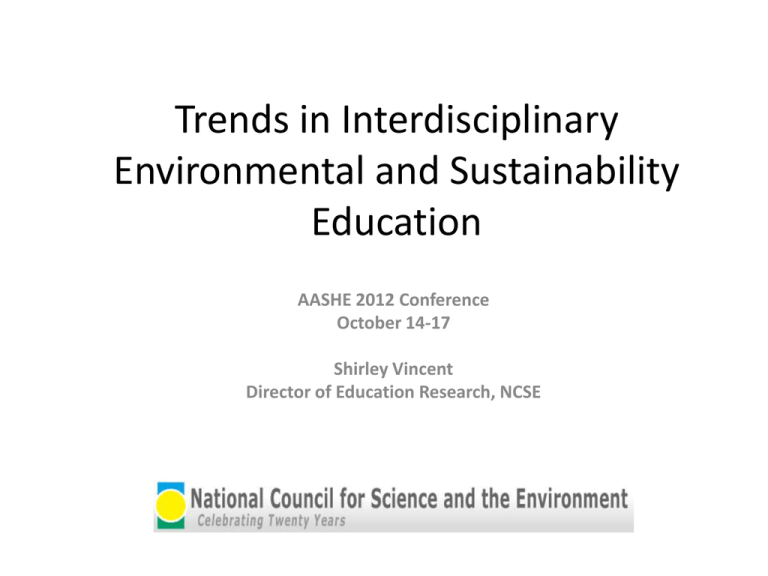
Trends in Interdisciplinary Environmental and Sustainability Education AASHE 2012 Conference October 14-17 Shirley Vincent Director of Education Research, NCSE Mission – improving the scientific basis for environmental decisionmaking Programs – foster collaboration between diverse institutions and individuals (research, education, environmental, and business organizations as well as governmental bodies) Education and Careers Science Solutions Science Policy International Council for Science and Environment Environmental Internship Clearinghouse NCSE Resources & Reports ncseonline.org • • • • • • • • • • • Conference videos, lectures, recommendations for decision-makers Climate change teaching modules/webinars Congressional Research Reports on environment and sustainability Interdisciplinary Environmental Education on the Nation’s Campuses: Elements of Field Identity and Curriculum Design - June 2010 Online Education Webinar Series Federal Funding for Environmental Research and Development - September 2012 Interdisciplinary Hiring and Career Development: Guidance for Individuals and Institutions - April 2011 Interdisciplinary Environmental and Sustainability Education: Results from the 2012 Census of U.S. Four-Year Colleges and Universities - September 2012 Non-traditional and Broad Energy Education: Results from the 2012 Census of U.S. Four-Year Colleges and Universities - October 2012 Sustainability Education: Results from the 2012 Census of U.S. Four-Year Colleges and Universities - November 2012 IE & sustainability degree programs survey results and analysis 2013 2012 Census of Environmental & Sustainability Academic Programs • All 1638 4-year HE institutions in U.S. – 2010 Carnegie Classification (76 multiple campus FP) • Interdisciplinary/broad programs • Discipline & professional fields with specializations • Minors/certificates • Center & Institutes Census Definitions of IE & Sustainability Academic Programs • Named environmental science(s) or studies, broadly focused programs in natural resources, related to the environment that incorporate an interdisciplinary approach (natural/social) • Focus on sustainability/sustainable theory and practice • Focus on energy sources not currently commonly and widely used in the United States (non-traditional energy) or those that focus on energy broadly Presentation Overview – Focus on sustainability academic programs but compare energy and all IE degree programs – Prevalence and distribution of HE institutions offering academic programs – Types of programs • Sustainability degrees • Sustainability specializations with disciplines and professional fields degrees • Sustainability minors and certificates – Administrative location of programs Sustainability Academic Programs 350 schools 576 programs/units 143 degrees 298 specializations 294 minors & certificates Energy Academic Programs 133 schools 190 programs/units 39 degrees 158 specializations 107 minors & certificates IE & Sustainability Degree Programs 842 schools (↑29%, +190) 1166 programs/units (↑39%, +326) 1859 degrees (↑57%, +676) Trends: Rapid Growth in HE Institutions Hosting Programs IE Degree Types Diversity Considerations Institutions Hosting Sustainability Academic Programs (22%) Institutions Hosting IE and Sustainability Degree Programs (51%) Sustainability Degree Programs Bachelor’s N=90 Master’s N=48 PhD N=5 Proportion N=143 Sustainability/Studies/Science/Systems 34 15 2 36% Sustainable Development/Communities 12 15 1 20% Environmental/Natural Resources Sustainability 20 4 2 18% Sustainability & Environmental Studies/Sciences 13 0 0 9% Sustainability Management (business/org?) 4 8 0 8% Global/International Sustainability 3 2 0 3% Other (Energy, Coastal, Peacebuilding) 4 4 0 6% 63% 34% 3% 100% Name Category Proportion of Total Sustainability Specializations in Discipline and Professional Field Degrees Bachelor’s N=139 Master’s N=138 Business Administration/Management/Leadership 29 41 2 24% Engineering/Technology 11 28 5 15% Interdisciplinary Environmental 35 5 2 14% Agriculture/Horticulture 30 4 1 12% Architecture/Built Environment 6 16 6 9% Natural Resources/Ecology 5 11 1 6% Regional/Urban/Community Planning 1 13 2 5% Public Policy/Affairs/Administration 5 9 1 5% Geography 8 1 0 3% Other (Anthropology, Chemistry, Economics, Education, Geoscience, Law, Tourism) 9 10 1 7% 47% 46% 7% 100% Disciplinary/Professional Field Proportion of Total PhD Proportion N=21 N=298 Energy Minors and Certificates UG N=205* GR N=82* Sustainability/Studies/Science 64 15 1 27% Sustainability Management/Leadership 20 27 14 21% Environmental/Natural Resources Sustainability 26 4 2 11% Sustainable Development 20 7 1 10% Architecture/Built Environment 11 10 2 8% Energy and Sustainability 15 3 1 6% Agriculture/Horticulture 12 5 1 6% Sustainability and Environmental Studies/Sciences 14 1 0 5% Engineering/Technology 8 4 3 5% Global/International Sustainability 12 2 0 5% Other (Law, Tourism, Politics and Policy) 3 4 0 2% 70%* 28%* 9%* Name Category Total Professional Proportion* N=25* N=294 *Some programs can be earned as UR or GR or UG/GR or professional so these numbers will not add to 294; likewise proportions will not equal 100% Administration Location of Sustainability Academic Programs Degree N=143 24% Specializations N=298 39% Minors & certificates N=294 31% Program that Spans Units 50% 33% 36% 37% School/Division within a College 1% 6% 3.5% 5% School/Division/College 10% 13% 13% 12% Other Location (Provost, US, GC) 2% 2% 2% 2% Consortium 3% 0% 0.5% 1% Center/Institute 10% 7% 14% 10% Administrative Location Department Overall N=735 33% IE and Sustainability Degree Program Administrative Locations 6% increase in IE/sustainability schools, colleges, centers and institutes 6% decrease in traditional departments No change in interdisciplinary departments or programs that span units Sustainability Academic Programs: Competition or Perception? Academic Program Type Sustainability degrees (SD) Interdisciplinary environmental degrees with sustainability track (IE) Other discipline/fields with sustainability track (OD) Sustainability minors and certificates (MC) SD IE OD MC - 5% 26% 46% 14% - 36% 36% 30% 11% - 55% 19% 5% 26% - • Schools tend to offer either sustainability degrees or IE with sustainability track, but not both • Many schools just offer minors and certificates • Schools that offer sustainability tracks within disciplines and fields tend to also offer sustainability degrees and minors/certificates, fewer with IE tracks NCSE Survey will Enhance Understanding – Survey instrument developed by experts (CEDD, AASHE, AAAS, AESS, NAEP) – Rich picture of curricula and administrative structures (resources, faculty, assessment, partners) – Distinctions between IE and sustainability programs, learn about nascent interdisciplinary energy and other programs – Processes used to align curricula with workforce – Learning outcomes and assessment criteria and processes Additional surveys including institute/center study Framework for Understanding IE Degree Programs svincent@ncseonline.org 918-629-5143 svincent@ncseonline.org 918-629-5143

